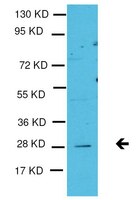miR-34a blocks osteoporosis and bone metastasis by inhibiting osteoclastogenesis and Tgif2.
Krzeszinski, JY; Wei, W; Huynh, H; Jin, Z; Wang, X; Chang, TC; Xie, XJ; He, L; Mangala, LS; Lopez-Berestein, G; Sood, AK; Mendell, JT; Wan, Y
Nature
512
431-5
2014
Abstract anzeigen
Bone-resorbing osteoclasts significantly contribute to osteoporosis and bone metastases of cancer. MicroRNAs play important roles in physiology and disease, and present tremendous therapeutic potential. Nonetheless, how microRNAs regulate skeletal biology is underexplored. Here we identify miR-34a as a novel and critical suppressor of osteoclastogenesis, bone resorption and the bone metastatic niche. miR-34a is downregulated during osteoclast differentiation. Osteoclastic miR-34a-overexpressing transgenic mice exhibit lower bone resorption and higher bone mass. Conversely, miR-34a knockout and heterozygous mice exhibit elevated bone resorption and reduced bone mass. Consequently, ovariectomy-induced osteoporosis, as well as bone metastasis of breast and skin cancers, are diminished in osteoclastic miR-34a transgenic mice, and can be effectively attenuated by miR-34a nanoparticle treatment. Mechanistically, we identify transforming growth factor-β-induced factor 2 (Tgif2) as an essential direct miR-34a target that is pro-osteoclastogenic. Tgif2 deletion reduces bone resorption and abolishes miR-34a regulation. Together, using mouse genetic, pharmacological and disease models, we reveal miR-34a as a key osteoclast suppressor and a potential therapeutic strategy to confer skeletal protection and ameliorate bone metastasis of cancers. | 25043055
 |









